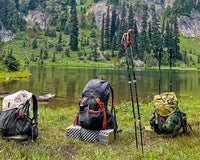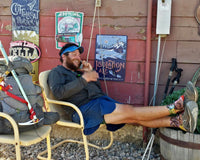
Many of us are familiar with the challenges of eating delicious, nutritious, nourishing food while wandering around in the backcountry. Nutrient-dense fruits and veggies are heavy and cumbersome, and prone to damage, spoilage and seeping their watery insides all over our bags.
Meanwhile, store-bought dehydrated meals often lack flavor, nutrition, satiation and digestibility, all the things we’re craving after a long day in the great outdoors, when we need replenishment the most.
That’s precisely where visionary dehydrated meals company, Farm to Summit, comes to the rescue. Founded in 2020 by life, business and adventure partners, Louise (Lou) and Jane Barden, the Durango, Colorado based business is on a mission to reinvent the way we nourish ourselves in the wild; and re-examine the impact that food has on our bodies, our food systems and our environment.

“I think what we’re trying to do is make something that tastes really good,” explained Lou, a self-proclaimed food snob. “When you open our bags, you can see all the veggies and all the texture and you can pronounce all our ingredients.”
Pouring over the product offerings is a mouth-watering pursuit, with colorful images of their Thai Red Curry, Thai Peanut Slaw, Anasazi Rice & Beans, and White Bean Potato Stew calling out to be devoured. For a little southwestern kick, the spice lovers have peppered in packets of dehydrated hot sauce alongside each meal so you can choose your own adventure.

The collaborative couple hasn’t stopped at noshables though; they also offer a great range of hand- and heart-warming beverages, like superfood turmeric lattes, chile mochas, and a variety of organic lattes for dairy drinkers and nut mylk lovers alike.
Lou, an ecologist, botanist and lifelong environmental conservationist, was inspired by two of her work colleagues while out on a 14-day backpacking trip in Yellowstone National Park. “We had a lot of time walking together, me and these two men,” Lou recalled, “and the entire time we were out there, they complained about their food.”
Their complaints, coupled with her own experience of lack-lustre dehydrated meals, got her Georgia-raised, home-cooked-meal loving, foodie gears turning.

“I started thinking to myself, I bet I could make backpacking meals taste better,” laughed Lou, who alluded to a hot sauce bottle or two going haywire in her backpack, “I called Jane as soon as I got out of the backcountry and told her we should start making backcountry meals.”
Meanwhile, back in Durango, the Michigan-born and third generation farm-raised Jane Barden, was helping some friends on their local produce farm. Their farm, like many others, often ended up with ‘perfectly imperfect’ produce that they were trying to find a home for.

“The boys kept trying to give me 50 pounds of carrots,” laughed Jane, who at first didn't have a use for the offering. But Lou’s idea sparked an insight, “I thought, maybe we can use some of this excess produce to put into the meals.”
And just like that, Farm to Summit became a dehydrated meals company, focused on producing delicious, healthy, farm fresh meals that prioritized minimizing food waste at the farm level by capturing their surplus and ‘seconds’ produce.

‘Seconds’ produce encompasses anything that doesn’t fit the stringent aesthetic standards of retailers and restaurants; it’s deemed too big, small, crooked, blemished, deformed, ripe or weather-damaged to be purchased.
Other times, farmers simply end up with a surplus of produce that can’t be captured by any other market. This excess, along with seconds, can sometimes be donated to local food banks or non-profits, provided they need it, want it, have a place to store it, and can process it before it goes bad. When it doesn’t have anywhere to go, the excess produce is left in the field to rot, or added to the compost pile, where farmers are forced to watch their hard work go to waste.

“There isn’t a lot of infrastructure set up to capture peoples produce in the southwest corner,” explained Lou, “if farmers can’t get it to where it needs to go, no one is going to come by and scoop it up.”
No one, that is, except Farm to Summit. The mighty team of two has already compiled an extensive list of local farmers who are happy to sell off their seconds to this new market of ‘upcycled produce’ meals.

“The best part of starting up has been engaging with the community and all the connections we’ve been able to make in a very short time,” Jane said. “We’re working with farmers to source produce and meeting all these badass people in the area who are doing such good work and are so generous.”
When some of the local farmers found out that the women didn’t have enough cooler space in their co-operative kitchen to store all the veggies before processing, they offered to keep the surplus in their own coolers and ‘slow feed’ them as needed, even if the produce came from another farm.

“The farmers are really stoked on having somewhere to go with their seconds,” explained Lou. “Unlike Georgia or Michigan, where we are from, the growing conditions are really challenging out here, and the farmers put so much work into growing out here. It’s high altitude, desert farming.”
While the Animas River valley provides nutrient rich soil for the Durango-based farmers, they are faced with numerous adversaries, like extreme drought, high winds, increased pests, monsoon rains, heavy flooding and spontaneous hail. On the plus side, as Jane pointed out, “We get a ton of hail damaged bok choy to use for our meals.”

The team bases their recipes off the veggies that come in, and the abundance of locally grown carrots makes it so almost every meal contains the vitamin-rich root vegetable. “Even our oatmeal is a carrot cake-based oatmeal,” laughed Lou.
“We’ve created a really cool model, because on the other side, we’re selling to people out there adventuring ... doing awesome backpacking trips, summiting peaks, bikepacking and packrafting,” Jane explained, “and we’re meeting wonderful people in that community as well.”

Jane and Lou, along with local contractors, will soon begin converting their newly leased, blank slate of a space into their very own commercial kitchen and office.
“Things happen slowly in Durango, for better or for worse,” Lou said, “we’ve been waiting on kitchen space and juggling between multiple places, so it will be nice when we have everything we need in one spot and can streamline production.”
The issues of single-use plastics and packaging plague every industry, and the dehydrated food sector is no exception. Jane and Lou researched high and low to source omni-degradable, hot water safe packaging for their Farm to Summit meals. This means that the pouches are both compostable and recyclable.

Farm to Summit also works with local food banks and nonprofits, donating 2% of their sales to help combat food insecurity.
Closing the gap between food insecurity and food waste drives Jane and Lou's big-picture goals for their fledgling brand. They hope to expand to the point where they're sourcing seconds from regional farms in addition to local ones.
“It’s such a huge issue in our food system that all this waste is happening at a farm level,” says Lou, “We want to be increasing the impact of decreasing food waste, and we feel that we can really make a difference by capturing seconds.”
Ali Becker is a freelance adventure writer and narrative storyteller who shares compelling conversations about personal transformations, overcoming limitations, wellness education and adventurous situations. You can follow her rambling adventures on social at @thisisalibecker or at her blog thisisalibecker.com.















